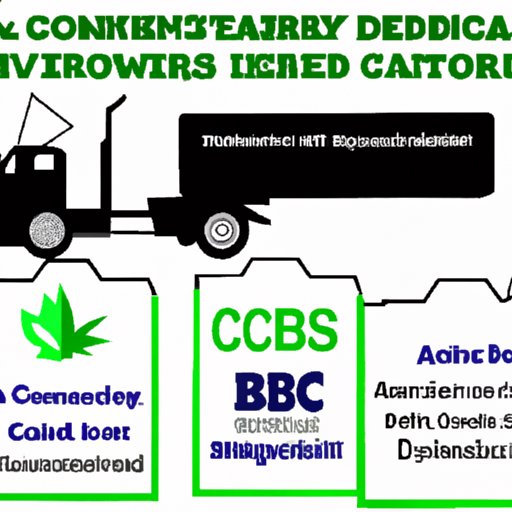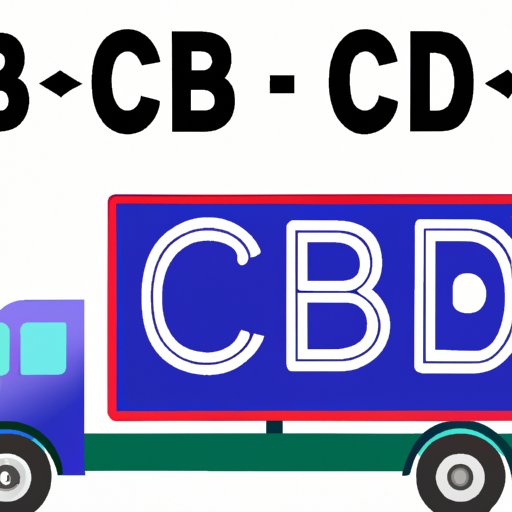
The Legality of CBD for Truck Drivers: Understanding the Risks and Benefits
As the use of CBD becomes more widespread, many truck drivers are wondering if they can legally use it while on the job. While CBD has been shown to offer various potential health benefits and has been legalized at the federal level, the legality of CBD for truck drivers is a complex issue that requires a closer look. In this article, we’ll explore what CBD is, its legal status, and how it relates to the trucking industry.

Section 1: The Legal Status of CBD for Truck Drivers: Everything You Need to Know
CBD, short for cannabidiol, is a compound found within the cannabis plant. Unlike THC, another psychoactive compound found in cannabis, CBD does not produce a “high” effect. In December 2018, CBD was legalized federally in the United States, under the Farm Bill of 2018, as long as it is derived from industrial hemp and contains less than 0.3% THC. However, there are still variations in CBD legality at the state level.
Regarding the trucking industry, CBD legality depends on whether the CBD is classified as an illegal substance under state or federal law. If a CBD product contains more than 0.3% THC – the federal legal allowance – it could be classified as a Schedule I controlled substance, which is illegal. However, if the CBD product is derived from industrial hemp and contains less than 0.3% THC, then it is legal under federal regulations.
Section 2: CBD and Trucking: Are Drivers Allowed to Use Cannabidiol?
While CBD is legal federally, the Federal Motor Carrier Safety Administration (FMCSA) is the governing body that regulates commercial truck drivers. The FMCSA banned the use of marijuana for truck drivers under its Drug and Alcohol Testing Regulations back in 1991. The regulations state that truck drivers are not allowed to use Schedule I drugs which include marijuana, cocaine, heroin, and other substances classified as illegal by the federal government. The FMCSA’s policy does not reference CBD use explicitly. However, since CBD is extracted from cannabis, there is some confusion surrounding its legality within the context of FMCSA regulations. According to the FMCSA, any detectable amount of THC is considered potentially hazardous. Therefore, even if a CBD product contains less than 0.3% THC, there’s still a chance that it could cause drug testing to produce a positive test result.
It is essential for truck drivers to know that even though the FMCSA does not test specifically for CBD, the agency has the right to do so. If a truck driver is found to have used a CBD product that causes a positive drug test result, they could face disciplinary measures. The FMCSA can take away a truck driver’s commercial driver’s license (CDL) if they test positive for any illegal controlled substance, including THC, even if CBD was the source of the positive test result.

Section 3: CBD and the FMCSA: Navigating the Complex Regulatory Landscape
Truck drivers should take great care when using CBD oil or other CBD products. Any CBD product that may contain THC, including full-spectrum CBD, could cause a positive drug test result. While some CBD products claim to contain no THC, the reliability of such products remains questionable. Under the FMCSA’s regulations, if a drug test reveals a detectable amount of THC within 30 days of performing safety-sensitive duties, the truck driver must be removed from operating a commercial vehicle for 60 days.
If a truck driver is taking CBD products and wants to ensure that they comply with FMCSA drug testing guidelines, they should inform their employer of their CBD use and ensure that the product they are using is free from THC. To minimize the risk of testing positive for THC, a truck driver should only use CBD products tested by a third-party lab and labeled as containing 0% THC. Truck drivers should also always follow the manufacturer’s instructions for use and avoid taking a higher dose than recommended.
Section 4: CBD and Drug Testing for Truck Drivers: A Comprehensive Guide
Drug testing is an unavoidable reality for truck drivers, and they must be aware of the different types of drug tests to which they may be subjected. The most common types of drug tests for truck drivers are urine drug tests, hair drug tests, and oral fluid (saliva) tests. Urine drug tests are the most common because they are the least expensive and easy to administer. However, they are also the least reliable since they can’t detect recent drug use. Hair drug tests, although more expensive, provide an extended window of detection, often up to 90 days. Oral fluid tests are becoming more popular as a quick and easy way to detect drugs.
If truck drivers consume CBD products that have a detectable amount of THC, they could receive a positive drug test result. The CBD products can interfere with the test results and create a THC positive test result. If a truck driver tests positive for THC, even if they believe CBD is the source of the positive test result, their CDL could be suspended, and they could be required to complete a drug rehabilitation program to get it back. Truck drivers must, therefore, be very careful about what they consume and be aware of the contents of any products they use.
Section 5: The Impact of CBD Legalization on Trucking Companies and Their Drivers
As CBD legalization continues to sweep across the United States, trucking companies and their drivers must be aware of how these changes affect their business. The legalization of CBD has caused controversy, mostly due to the difficulty in discerning high-quality products that contain only CBD. Many companies have opted to update their drug policy to exclude CBD products altogether from their testing programs. However, this will not change the fact that federal regulations prohibit commercial truck drivers from using cannabis or any other Schedule I controlled substance.
Employers must educate their employees about the risks associated with using CBD as well as the potential legal consequences if they test positive for THC. If trucking companies have a zero-tolerance policy for cannabis, employees must be aware of that policy and its consequences. Employee education and awareness are vital in the trucking industry because drivers are often on the move and away from home for extended periods.
Section 6: Is CBD Oil Safe and Legal for Truck Drivers? Exploring the Risks and Benefits
It’s clear that truck drivers who use CBD oil, even if it’s legal in their state, run the risk of testing positive for THC, which could cause disciplinary action from the FMCSA and put their careers and their employers’ business at risk. However, there are potential benefits to using CBD products that could make it attractive to truck drivers, such as improving insomnia, reducing anxiety or pain relief.
Truck drivers who are considering using CBD products should speak to a healthcare provider who can help them determine if the potential benefits outweigh the risks with their current employer. Alternatively, they can reach out to addiction and mental health professionals who are experienced in working with truck drivers and substance use disorders.
Conclusion:
For truck drivers, CBD legality is a complex issue that requires careful consideration. While CBD has been legalized federally, truck drivers must be aware of how FMCSA regulations relate to CBD use and how to mitigate the risks associated with drug testing. If a truck driver is considering using CBD, they should consult with their employer and healthcare provider to determine the appropriateness of such use and look into the resources available to them. The key to staying safe and compliant with these regulations is education, awareness, and making informed decisions.
